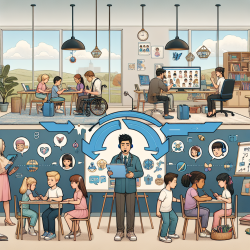Introduction
In the evolving landscape of speech-language pathology, the integration of open science principles offers a promising avenue for enhancing therapeutic outcomes. The research article, Making Open Science Work for Science and Society, underscores the importance of transparency and accessibility in scientific endeavors. This blog aims to explore how practitioners in speech-language pathology can leverage these insights to improve their practice and outcomes for children.
The Open Science Movement
The open science movement is fundamentally about making scientific research more accessible, transparent, and reproducible. By sharing data, methodologies, and findings openly, the movement seeks to foster collaboration and innovation. For speech-language pathologists, this approach can be transformative. Access to a broader range of data and research can enhance evidence-based practice, ensuring interventions are grounded in the most current and comprehensive evidence available.
Scientifically Relevant Transparency
One of the key distinctions made in the research is between "scientifically relevant transparency" and "socially relevant transparency." The former focuses on making data and methodologies available to other scientists, which is crucial for advancing research and ensuring the reliability of findings. For practitioners, this means having access to a wealth of data that can inform their practice. By engaging with open-access journals and databases, speech-language pathologists can stay abreast of the latest research and integrate new findings into their therapeutic approaches.
Socially Relevant Transparency
On the other hand, "socially relevant transparency" is about making scientific information accessible and usable for non-specialists, including decision-makers and the general public. For speech-language pathologists, this involves translating complex research findings into actionable insights that can be communicated to parents, educators, and other stakeholders. This transparency ensures that all parties involved in a child's care are informed and can collaborate effectively to support the child's development.
Implementing Open Science in Practice
To effectively implement open science principles, practitioners can adopt several strategies:
- Engage with Open-Access Resources: Regularly consult open-access journals and databases to stay informed about the latest research and evidence-based practices.
- Collaborate with Researchers: Partner with researchers to contribute to and utilize large-scale data sets, which can provide insights into effective interventions.
- Communicate with Stakeholders: Develop clear, accessible communication strategies to share research findings with parents, educators, and other stakeholders involved in a child's care.
- Advocate for Transparency: Encourage institutions and organizations to adopt open science policies, ensuring that research is conducted transparently and ethically.
Conclusion
By embracing the principles of open science, speech-language pathologists can enhance their practice, improve outcomes for children, and contribute to a more transparent and collaborative scientific community. The integration of open science into speech-language pathology not only supports evidence-based practice but also empowers practitioners to make informed, data-driven decisions that benefit the children they serve.
To read the original research paper, please follow this link: Making Open Science Work for Science and Society.










